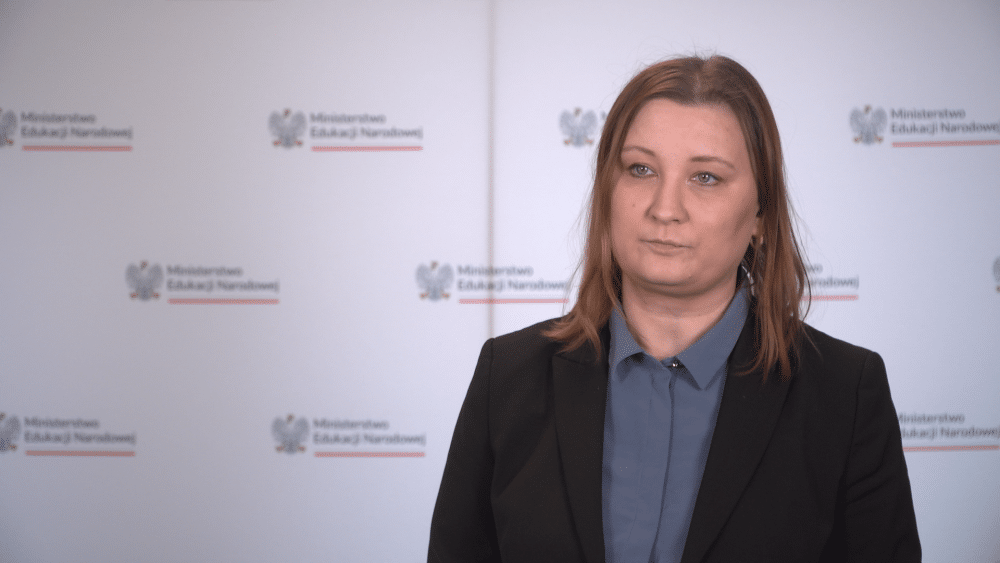The mental health crisis among students has long been evident in the entire school environment. This is confirmed by recent reports and police statistics on teenage suicides. Therefore, comprehensive changes in Polish schools have become one of the first points on the agenda of the new Ministry of Education under the leadership of Barbara Nowacka. The ministry plans reforms to make schools more supportive and friendly for students, including providing a psychologist in every school, training, and psychological support for students, parents, and teachers.
“The Ministry of Education has various priorities related to students’ mental health, but the first and most important issue we want to address is that a psychologist must work in every school, be available, and respond to the needs of students,” says Paulina Piechna-Więckiewicz, Deputy Minister in the Ministry of National Education, responsible for student’s mental health. “We also prioritize training for subject teachers, educators, school psychologists, and pedagogues. But we also want to cooperate with parents because what happens at home is important. Parental cooperation with the school can have spectacular results. We also intend to introduce peer-to-peer support programs. Such programs are functioning worldwide and are successful. We want the entire school community – with all the participants of the educational process – to work for mental health.”
The mental health crisis among Polish youth is one of the first topics addressed by the new Ministry of Education under the leadership of Barbara Nowacka. At the turn of February and March, the ministry organised a Mental Health Week, during which ministers met with representatives from various environments active in the field of children’s and teenagers’ mental health. Around 600 people participated in meetings discussing promotion and prophylaxis mental health, children and adolescents’ depression or professional burnout of teachers; among them were representatives of NGOs, teachers’ unions, education workers, public health experts, scientists, psychology and psychiatry specialists. The youth also had a say in the discussion.
The participants stressed the need for structural changes in Polish schools regarding the accessibility of psychologists and the need to strengthen teachers’ psycho-education competencies. The need to strengthen day support specialist establishments, so more children can benefit from their help, and parents’ role in preventing depressive states and behaviours, were also indicated. The conclusions and postulates from these debates are now the foundation for working out solutions to support children and youth mental health systemically.
“In recent years, schools have generally been undervalued, teachers and students have felt a bit abandoned. Therefore, we begin with a diagnosis of the well-being, mental health of pupils – how they feel at school, how we can help them, how to act so that it really is effective,” says Maciej Jakubowski, Ph.D., professor at the University of Warsaw, director of the Institute for Education Research. “We already have ready tools with which we help schools and pupils, at primary, high school, and preschool levels. It’s already happening, but we want to improve and expand the scope of these activities, so it reaches all schools in Poland.”
The week ended with the presentation of IBE’s new project “Supporting the availability of education for children and youth”, which identified four priorities for improving students’ mental condition: prevention, promotion of mental health, crisis support, and assistance in returning to health. To develop these actions, wide cooperation was launched between the Ministry of Education, Health, and Family and the Institute for Education Research, to which expert institutions and organizations were also invited.
“Children and youth’s mental health has not been a priority in recent years. We know that many negative things have happened, and we know that after the COVID-19 pandemic, mental health is an even bigger challenge. Therefore, this project aims to conduct a thorough diagnosis of well-being, students’ mental health, and develop effective methods and models for supporting children and youth,” emphasizes professor Maciej Jakubowski. “We want to involve various partners in this project – not only the ministry but also social partners, NGOs, and experts, to jointly develop effective student support models. But these are not things that we can solve in a few months or half a year, so the whole project is scheduled for several years.”
Experts highlight that the mental health crisis among children and youth is compounded by various factors, including isolation forced by the COVID-19 pandemic, daily stress and loneliness, high ambitions alongside parental helplessness towards children, peer hate, and uncontrolled access to social media. A significant problem is also educational pressure and student burnout resulting from the high demands of school.
The Ministry of National Education plans reforms to make it more supportive and friendly for students. Among the planned or already started changes is changing the formula of homework in public elementary schools and reforming the core curricula, consultations of which started in mid-February.
“The changes proposed by the ministry are in the right direction, because it is very important, among others, that a psychologist is available in every school for the student. However, this psychologist must also have the appropriate tools and support. Therefore, our project aims to develop such support methods for both students and teachers and psychologists, equip them with tools and ways of helping so that this support directed to students is really effective and that children and youth’s mental health improves,” emphasizes the director of the Institute of Education Research.
